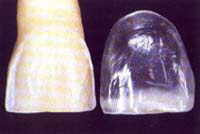In recent years, the concept of
minimally invasive and conservative restorative dentistry has become popular and well
accepted by dental practitioners. Advances in adhesive dentistry and the development of
tooth -coloured materials allow dentists to practice minimally invasive dentistry and
preserve more tooth structure when rendering extensive restorative dentistry.
When the colour of substructure is ideal, removing sound
tooth structure to acquire retention or provide additional room to accommodate restorative
materials is ethically questionable, considering the many scientific developments in both
adhesive and aesthetic dentistry .Extending the margin of a restoration subgingivally to
attain retention or for esthetic considerations disregards the results of exhaustive
efforts made by scientific investigators who have worked diligently for decades to provide
us with the current concepts in adhesive dentistry.
Etched porcelain-bonded restorations such as porcelain
veneers have become the esthetic restorations of choice by many practitioners Three
distinct factors make porcelain veneers ideal (1)minimal tooth reduction (2)endurance, and
(3) allowing the substrate to dictate the esthetic outcome whenever possible.
CONTACT LENS EFFECT
 In the presence of sound enamel, ideal tooth structure, and harmonious, tooth
location, it is disturbing to witness excess reduction of non discoloured enamel and
dentin to provide space for placement of direct and indirect esthtic restorations .Bonding
a very translucent porcelain or composite to minimally prepared non discoloured teeth
allows the substrate to dictate the esthetic outcome without interfering with the
transmission of light. This phenomenon is known as the contact lens effcet. And calls for
the replacement of the achromatic enamel with an ideally formed yet translucent
substance(Figure 1)Improving the colour of the substrate by bleaching in advance of boding
esthetic restorations offers valuable advantages, including less tooth reduction less
exposed dentin, better esthetic results, and less interference with the transmission of
light
In the presence of sound enamel, ideal tooth structure, and harmonious, tooth
location, it is disturbing to witness excess reduction of non discoloured enamel and
dentin to provide space for placement of direct and indirect esthtic restorations .Bonding
a very translucent porcelain or composite to minimally prepared non discoloured teeth
allows the substrate to dictate the esthetic outcome without interfering with the
transmission of light. This phenomenon is known as the contact lens effcet. And calls for
the replacement of the achromatic enamel with an ideally formed yet translucent
substance(Figure 1)Improving the colour of the substrate by bleaching in advance of boding
esthetic restorations offers valuable advantages, including less tooth reduction less
exposed dentin, better esthetic results, and less interference with the transmission of
light
ADVANCES IN PORCELIAN VENEERS
To achieve these goals, new porcelains and composite resins
have been developed. Porcelain veneers fabricated from traditional feldspathic porcelain
designed for ceramometal restorations are often chromatic and opacions. These porcelains
have the unique quality of masking the opaque layer at a minimal thickness. When the
colour of tooth substrate is less than ideal and cannot be whitened by bleaching, these
porcelains provide acceptable esthetic results.
The manufacturers of porcelains have developed chromatic and
opacious porcelain, as well as masking dentin, for veneering severely discoloured teeth.
Broad shades of enamel porcelain with different degrees of translucency have also been
developed for porcelain veneers to allow maximum transmission of light when the
substruture is not discoloured. Opacious dentin has been introduced to prevent the
show-through of the incisal edge or diastema when sufficient tooth structure is absent.
COMPOSITE RESIN RESTORATIONS
Until very recently, the manufacturers of composite resins
have not kept up with the developments and advances observed with porcelain veneers . Most
composite resins contain three shades of incisal translucency ;light, medium, and dark.
They contain a broad range of dentin shades developed based on the expanded shades of the
Vita shadeguide. Various shades of tints and opaques are available to harmonise the colour
of composite resin with adjacent teeth. Additional tooth reduction is recommended and
required to accommodate room for placement of various layers.
These developments and assortments have made it unnecessarily
difficult, time consuming and confusing for practitioners to place esthetically pleasing
direct composite veneers. For most practising dentists, placement of an ideal direct
composite veneer translates into extensive steps, extended chair time, extensive tooth
reduction, a certain artistic ability, and a restoration that does not last as long as a
porcelain veneer.
VITALESCENCE
A composite resin(Vitalescence,Ultradent Products,Inc) has
been developed based on the principles listed for porcelain veneers. It requires fever
steps, minimal tooth reduction, less use of dentin shades, and uses the colour of
substrate to enhance the esthetic outcome. The use of dentin composite is limited to areas
of missing tooth structure or severely discoloured substructure.
Improving the colour of substructure by bleaching before for
placement of direct or indirect veneers is paramount. The tooth bleaching technology has
been advanced, and new bleaching products have been developed to whiten the colour of the
teeth and reduce the need for unnecessary use of masking and opaque layers .Minimal tooth
reduction using the concept of translucency and minimally invasive dentistry is
encouraged(Figure 2)
The article matter was written by Dr.Naseer Barghi and published in Contemporary
Esthetics. All rights of the author are duely acknowledged.